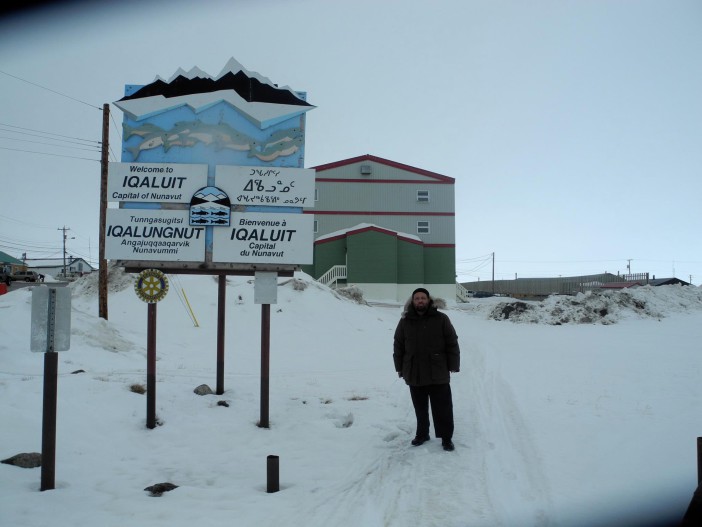The ability of humans to thrive in some of the world’s harshest and most inhospitable terrains never ceases to amaze. There are few places on earth where communities have yet to populate, braving some of the most severe conditions imaginable.
Such is the case in Canada’s north-east, were around 8000 people now call the city of Iqaluit (ee-ka-lu-wate) home. Situated in the province of Nunavut, a region bordering the Arctic Circle and just over 1000km from neighbouring Greenland; temperatures on average drop to around -10.0 °C during large parts of the year.
Despite being situated in such a far flung part of the world, religion and culture remain prominent amongst those that amazingly call Iqaluit home. Muslims in the city amount to around 100, although the population is likely to grow exponentially in coming years.
How Muslims came to the Arctic
Their existence in Nunavut is nothing new however, as Muslims have been taking up residence in the area for several decades already. This has been due to a growth in business opportunities up north, with Muslim businessman from across the globe seeing the region as particularly prospective. In addition the area has seen a lot of activity on a scientific front in terms of research.
The Muslim community in Iqaluit is particularly multi-cultural, with individuals from Pakistan, Morocco, and West Africa amongst those who have braved the wintery conditions in search of employment. Formerly based in South Africa, Sheikh Dr Abdullah Hakim Quick, the head of the History Department at the Al Maghrib Institute and da’wah coordinator for the Canadian Council of Imams, noted that despite being somewhat desolate the city still offered far more job opportunities than the Canadian capital of Ottawa.
In addition, he highlighted the fact that the Muslim community also compromised a fair portion of the ethnic Inuit population, incorrectly referred to as ‘Eskimos’ (a Native American term used to describe the Inuit as ‘eaters of raw meat’).
“Eskimo is a bad word. The Inuit, who are the aboriginal people, have been embracing Islam and form part of the community as well. This is the unique thing about this community, it has active Inuit people who are involved,” he explained.
‘Iqaluit community is tightly-knit’
The local Inuit have however not been impervious to the wave of media coverage that has sought to perpetuate the Islamic culture as one rooted in violence and extremism. But despite those sentiments having initially filtered through the community, the close-knit nature of the community has allowed Muslims in the city to shed any negativity perceptions that may have arisen.
“People have been given a wrong impression, and the Inuit people like other Canadians watch T.V and movies. However, because the people are very family orientated and because of the weather, where 10 months of the year it is extremely cold, people are very tightly-knit. Muslims have been playing a very important role,” explained Dr Quick.
First mosque
Because the community is so minute, Muslims have until now had to resign themselves to the use of a temporary Islamic prayer facility within a resident’s home; something that is likely to prove problematic as the community grows.
This led to the establishment of the Islamic Society of Nunavut. In 2014, permission was officially obtain from the Iqaluit City Council for the establishment of a proper Islamic Centre, and early this month construction on the facility officially kicked off.
“Alhadullilah, it is an extremely positive move for Muslims in the north,” said Quick.
The two-storey building will likely be small by international standards, but will include sufficient prayer space, as well as classrooms for Islamic educational purposes. Project coordinators are hoping to bring in a full-time Imam, and upon its completion the centre will cater to around 100-200 Muslims at once.
The project has not come without its fair share of challenges however. Due to the extreme nature of weather conditions in the region, construction could potentially face major delays. This is compounded by the fact that there is a limited time-frame in which the building must be completed, before the most severe weather kicks in.
“Once October comes everything is frozen and you can’t do anything. Late-October and November everything is ice, so you have to do it before then. We have about a two month period to build, but most of the supplies have reached already,” he said.
Another stumbling block is a current shortage of funds, with the organisation still C$300 000 short of what is needed to complete the project. Quick said they had received a lot of verbal support, but much of that had yet to come through. Hence they were taking their appeal to the masses.
“We decided we are going to depend upon Allah and go forward with the project. We have begun and the first wall is up. They are working on the first floor and are moving at a rapid pace,” he explained, adding that the project in its entirety was likely to cost well over C$1 million.
“We are in a rush situation because we started the building, and we now need this C$300 000 to at least be able to finish and open the doors, so that our brothers and sisters can come in and be warm before the October snows start”.
South Africans who wish to contribute towards the initiative are urged to make their deposits using the following bank details:
Bank CIBC
Account # 76-03215
Transit 06899
Institution 010
Account Title Islamic Society of Nunavut
For more information on the proposed facility, visit www.iqaluitmasjid.com. VOC (Mubeen Banderker)






 WhatsApp us
WhatsApp us 

